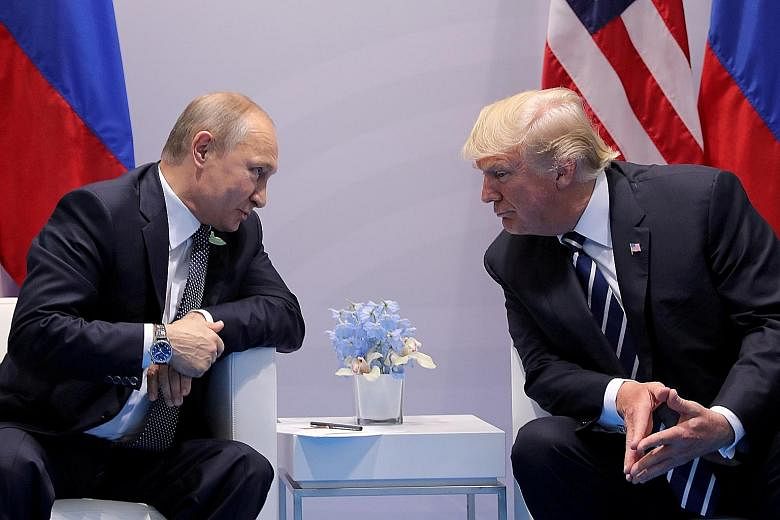WASHINGTON • United States President Donald Trump's appetite for a meeting with President Vladimir Putin of Russia, his aides say, was whetted by his talks with Mr Kim Jong Un, the leader of North Korea, two weeks ago.
But it is precisely that encounter that is stirring unease among foreign policy experts, including some in his own administration.
They worry Mr Trump will make the same kinds of concessions to Mr Putin when they meet in Helsinki on July 16 that he made to Mr Kim in Singapore, tilting a relationship that has already swung in Russia's favour.
In the past few weeks alone, Mr Trump has called for Russia to be readmitted to the Group of Seven industrial powers, suggested it has a legitimate claim to Crimea because a lot of Russian speakers live there and continued sowing doubts about whether Moscow meddled in the 2016 presidential election - or if it did, whether the sabotage actually benefited Mrs Hillary Clinton.
Russia was expelled from what was then called the Group of Eight in 2014 because of its annexation of Crimea from Ukraine.
In Singapore, Mr Trump emerged from a lunch of sweet and sour crispy pork with Mr Kim to declare he had solved the nuclear crisis with North Korea, even though the North conceded nothing on its weapons and missile programmes.
Mr Trump also cancelled joint military exercises with South Korea, a concession long sought by Pyongyang.
It has become a recurring motif for Mr Trump as a statesman: Last November, he lavished praise on Chinese President Xi Jinping after a one-on-one meeting in Beijing, during which Mr Xi offered no concrete concession on trade - an issue that matters more to Mr Trump than almost any other.
What these three leaders have in common is that they are autocrats, whom Mr Trump admires and believes he can win over with a brand of personal diplomacy that dispenses with briefing papers or talking points and relies instead on a combination of flattery, cajolery and improvisation.
"Trump sees a good meeting as a positive diplomatic achievement," said Mr Michael McFaul, a former American ambassador to Moscow.
"That's wrong. Good meetings are a means to an end."
Given Russia's record of malfeasance - from its annexation of Crimea to its interference in the American election - Mr McFaul said, "Trump should not praise Putin and signal a desire to just move on".
"That does not serve American national interests," he said.
US Secretary of State Mike Pompeo and other officials insist that the Trump administration has been tougher towards Russia than the Obama administration was. They cite US sanctions, the arming of Ukrainian troops, expulsion of diplomats and vocal public shaming of Russia for its cyber attacks.
But even if that is true - and former Obama officials dispute it - Mr Trump's steadfast refusal to criticise Mr Putin has largely vitiated these measures.
"What matters is what the President says," said Mr Nicholas Burns, a diplomat who served in the Bill Clinton and George W. Bush administrations. "And what he's been saying completely undermines the policy. It's like he's untethered from his own administration."
Even those who credit the President for taking steps that Mr Obama did not, such as sending lethal weapons to Ukraine, say those measures are largely lost in Mr Trump's mystifying embrace of Mr Putin.
"The administration's staffers are focused on the lyrics," said Mr Richard Haass, the president of the Council on Foreign Relations. "What they are ignoring is the music. Some of the lyrics are tough, but the music is a love song."
Mr McFaul predicted that Mr Putin would be a formidable counterpart in a one-on-one meeting, well briefed on American foreign policy and determined to use that knowledge to undermine the administration's policies, especially on Ukraine.
A common thread in Mr Trump's approach to autocrats, Mr Haass said, is that he views these relationships as having no history, no baggage that constrains how these leaders may act. They are purely personal encounters, with none of the trade-offs or compromises that usually characterise summits.
NYTIMES

